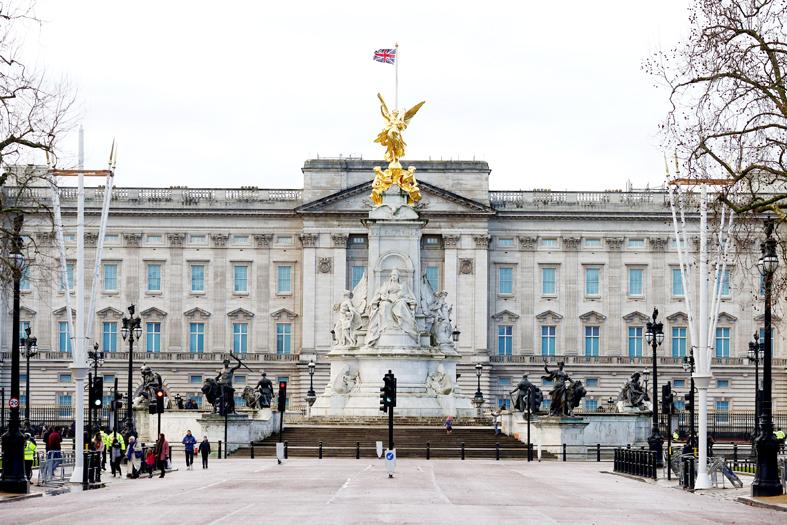The Maori party of New Zealand has called for a “divorce” from the crown and removal of the British royal family as New Zealand’s head of state.
The call came on the 182nd anniversary of the signing of the treaty of Waitangi, or Te Tiriti o Waitangi, New Zealand’s foundational legal document.
“If you look at our founding covenant as a marriage between tangata whenua [indigenous people] and the crown, then Te Tiriti is the child of that marriage. It’s time [for] tangata whenua to take full custody,” Maori Pati coleader Rawiri Waititi said.

Photo: Reuters
“This won’t mean the crown is off the hook. If a couple gets divorced, you don’t lose responsibility for your child. This will be an opportunity to reimagine a more meaningful and fulfilling partnership,” he said.
The treaty guaranteed Maori the crown’s protection of their land rights. However, in the 100 years that followed its signing, Maori lost more than 90 percent of their land through a mixture of outright confiscation by the crown, private or government sales and land court practices that did not recognize collective ownership.
Past pushes for New Zealand to become a republic has struggled to gain momentum. Polling from Colmar Brunton last year found that one-third of New Zealanders wanted to cut ties with the monarchy, while 47 percent did not and 20 percent did not know.
New Zealand Prime Minister Jacinda Ardern has said she is a republican and last year said she believed New Zealand would become a republic in her lifetime, but that she would not take action on it during her term.
Speaking at the announcement of New Zealand Governor-General Cindy Kiro, Ardern said she had had “never sensed urgency” from the public to make it happen.
“I’ve been very clear that despite being a republican, I’m not of the view that in the here-and-now ... this is something New Zealanders feel particularly strongly about,” she said.
The call for removing the queen as head of state is a shift in policy for the Maori party, which in 2017 objected to calls for a republic from within Labour.
Under current leadership, the Maori party holds two seats in New Zealand’s Parliament, and is pushing for constitutional reform in New Zealand, including the establishment of a Maori parliament.
“The only way this nation can work is when Maori assert their rights to self-management, self-determination and self-governance over all our domains. Our vision is for constitutional transformation that restores the tino rangatiratanga [full sovereignty] of tangata whenua in this country,” coleader Debbie Ngarewa-Packer said.

The team behind the long-awaited Vera Rubin Observatory in Chile yesterday published their first images, revealing breathtaking views of star-forming regions as well as distant galaxies. More than two decades in the making, the giant US-funded telescope sits perched at the summit of Cerro Pachon in central Chile, where dark skies and dry air provide ideal conditions for observing the cosmos. One of the debut images is a composite of 678 exposures taken over just seven hours, capturing the Trifid Nebula and the Lagoon Nebula — both several thousand light-years from Earth — glowing in vivid pinks against orange-red backdrops. The new image

Canada and the EU on Monday signed a defense and security pact as the transatlantic partners seek to better confront Russia, with worries over Washington’s reliability under US President Donald Trump. The deal was announced after a summit in Brussels between Canadian Prime Minister Mark Carney and European Commission President Ursula von der Leyen and European Council President Antonio Costa. “While NATO remains the cornerstone of our collective defense, this partnership will allow us to strengthen our preparedness ... to invest more and to invest smarter,” Costa told a news conference. “It opens new opportunities for companies on both sides of the

ESPIONAGE: The British government’s decision on the proposed embassy hinges on the security of underground data cables, a former diplomat has said A US intervention over China’s proposed new embassy in London has thrown a potential resolution “up in the air,” campaigners have said, amid concerns over the site’s proximity to a sensitive hub of critical communication cables. The furor over a new “super-embassy” on the edge of London’s financial district was reignited last week when the White House said it was “deeply concerned” over potential Chinese access to “the sensitive communications of one of our closest allies.” The Dutch parliament has also raised concerns about Beijing’s ideal location of Royal Mint Court, on the edge of the City of London, which has so

OVERHAUL: The move would likely mark the end to Voice of America, which was founded in 1942 to counter Nazi propaganda and operated in nearly 50 languages The parent agency of Voice of America (VOA) on Friday said it had issued termination notices to more than 639 more staff, completing an 85 percent decrease in personnel since March and effectively spelling the end of a broadcasting network founded to counter Nazi propaganda. US Agency for Global Media (USAGM) senior advisor Kari Lake said the staff reduction meant 1,400 positions had been eliminated as part of US President Donald Trump’s agenda to cut staffing at the agency to a statutory minimum. “Reduction in Force Termination Notices were sent to 639 employees at USAGM and Voice of America, part of a